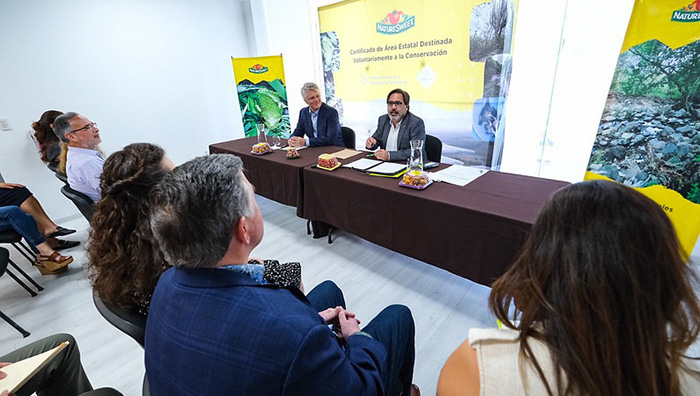- NatureSweet is committed to an ecologically rich area of the Sierra de Manantlán Reserve located in Tuxcacuesco
Guadalajara, Jalisco. April 21, 2023. – In an unprecedented event in Jalisco, an agricultural company has committed to preserving a great environmental wealth in the Sierra de Manantlan Reserve.
And in order to maintain a good state of conservation of the natural resources located in the estate known as La Bolsa, the Ministry of the Environment and Territorial Development (Semadet) has granted a certificate to the company NatureSweet, which manages this site, by which it is recognized as a Protected Natural Area (ANP) according to the ANP method. The mandate is Voluntary Designated Conservation (AEDVC) as defined in the state’s Ecological Equilibrium and Environmental Protection Act (LEEEPA).
The certificate was presented by the Chief Minister of Environment and Development of Jalisco, Israel García Ochoa to Rodolfo Spielman, CEO and President of NatureSweet. This is the first state voluntary Designated Conservation Area (AEDVC) in Jalisco, so it also represents a collaborative path to promote projects in the interest of biodiversity conservation and environmental protection between both institutions.
The property designated for conservation is located in the municipality of Tuxcacuesco and covers an area of 50.08 hectares and provides suitable conditions for the preservation of biodiversity and ecosystem services since it is a control area for water delivery during torrential events. Forest cover has recovered in recent years; It presents two distinct areas of vegetation, dry scrub and gallery. It is a potential area for microclimate regulation, carbon sequestration, provides opportunities for biological research and is home to various species with some irrigation categories defined by current environmental regulations.
Among the plants that we can find on the estate, tiscalam (Ficus petiolaris), ironwood (Amphipterygium adstringens) and white copal (Bursera copallifera) species endemic to Mexico stand out with their woodiness and cultural value; Plus white huizache, pitaya cimarrona, garabato, cat’s claw, san juan flower, feverfew, guamúchil, pear, scorpion, eggplant, amole, jam and wild purslane.
There are also insects such as praying mantises, dung beetles and bees; reptiles such as the black iguana, green iguana, alicante, Pacific spiny lizard, giant spotted huico of the coast of Jalisco; Birds such as the red-headed eagle, tyrant, pintifue, barn swallow, and river swallow. Mammals include the Mexican spiny mouse, mountain hare, red-bellied squirrel, tigrelo, ocelot, armadillo, opossum, and cacomixtel, among others.
By the way, a year ago, this company was involved in a labor dispute with its workers over a profit-sharing dispute.
This caused the Ministry of Labor and Social Welfare (STyPS) to reconcile the managers and about 4,800 workers at the Nature Sweet Zapotlán El Grande plant.
Marco Valerio Pérez Gollaz, Minister of Labor and Social Welfare, went to the Nature Sweet facilities to mediate a dispute in which workers disagreed with the difference in payment corresponding to profit-sharing benefits; With them he agreed primarily to the removal of the picket and the liberation of the highway to Ciudad Guzmán and its return to work without retaliation from the company.
Negotiations led by the Minister of Labor ended with the company committing that PTU benefit payment would be a reality, in addition to covering full salary for the week in question.
Perez Gollaz attended the dialogue with the workers, accompanied by the inspection personnel, to verify the legal documents and information corresponding to the company’s income from profits during the fiscal year 2021 and thus cover the payment of 10% to the workers as provided by law.
data
ANPs have proven to be the most effective tools for protecting biodiversity and ecosystem services, as they order land use, promote sustainable production methods for the well-being of local people, and are ideal spaces for environmental education and investigation.
More at Pronotecas
This and more information can be read, seen or heard at Brunettes. Follow us on Facebook @tweet. Our Twitter @tweet. on Instagram @tweetYes Or you can subscribe to the YouTube channel pruneose. Listen to the Brunoticias Podcast on SpotifyAnd Apple Podcast And Google Podcast





